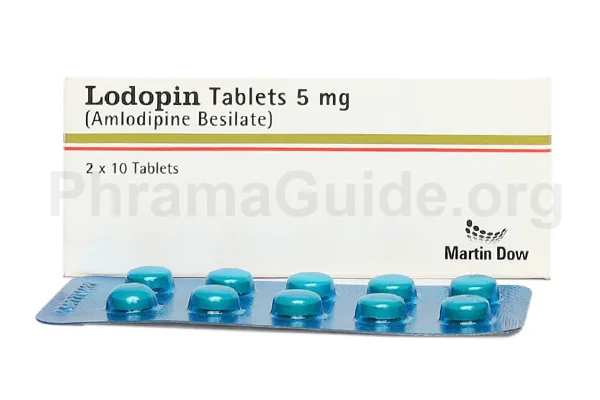Lodopin tablet is used for the treatment of high blood pressure (hypertension) and certain types of chest pain called angina. It belongs to calcium channel blockers, a class of drugs used to relax blood vessels and improve blood flow. Following are some approved and off-label uses of Lodopin Tablet:
Approved Uses of Lodopin Tablet
- Hypertension: Lodopin tablet is commonly used to lower blood pressure in patients with hypertension. It can be used as monotherapy or in combination with other antihypertensive medications.
- Angina: Lodopin tablet is also used for the treatment of chronic stable angina and vasospastic angina (Prinzmetal’s angina). It helps to relieve chest pain, reduce the frequency of angina episodes, and improve exercise tolerance.
- Coronary Artery Disease: Lodopin tablet is used in patients with coronary artery disease to improve blood flow to the heart, reduce the risk of angina, and prevent complications such as heart attacks.
- Hypertrophic Cardiomyopathy: Lodopin tablets can be used in the treatment of hypertrophic cardiomyopathy, a condition characterized by the thickening of the heart muscle, which can impair its function. Lodopin helps to relax the blood vessels and improve blood flow in these patients.
Off-label Uses of Lodopin Tablet
- Migraine prevention: Lodopin tablet has been used off-label in some cases for the prevention of migraines. The rationale behind this is its potential to relax blood vessels and reduce vasospasm, which is thought to contribute to migraines.
- Raynaud’s Phenomenon is Associated with Other Conditions: Lodopin tablets may be used to manage Raynaud’s phenomenon associated with conditions like systemic sclerosis (scleroderma) or lupus. By dilating blood vessels, it can help improve blood flow to the extremities and reduce symptoms.
- Pulmonary Hypertension: Lodopin tablet has been used in some cases to manage pulmonary hypertension, a condition characterized by increased blood pressure in the arteries that supply the lungs. It may be used in combination with other medications approved for this indication.
- Heart Failure: In certain cases, Lodopin tablets may be used in the treatment of heart failure. It may be considered in combination with other medications to help manage symptoms and improve cardiac function.

What is Lodopin?
Lodopin is one of the leading brands of Amlodipine, manufactured and marketed by Martin Dow Marker Ltd, Pakistan.
Lodopin Alternatives : Other Similar Brands
Below are some available similar brands that can be used as an alternative to Lodopin:
- Norvasc : Pfizer Laboratories Inc.
- Sofvasc : Wilsons Pharmaceuticals, Pakistan.
- Onato : Sami Pharmaceuticals (Pvt) Ltd, Pakistan.
- Ampress : Barrett Hodgson Pakistan (Pvt) Ltd.
- Hypotin : Donvalley Pharmaceuticals (Pvt) Ltd. Pakistan.
- Lodopin : Merck (Pvt) Ltd.
- Amodip : Mass Pharma (Pvt) Ltd, Pakistan.
- Zodip : Zafa Pharmaceutical Laboratories (Pvt) Ltd. Pakistan.
- Coram : Brookes Pharmaceutical Laboratories Pakistan, Ltd.
- Amdipine : Nabiqasim Industries (Pvt) Ltd. Pakistan.
- Cardiovasc : Werrick Pharmaceuticals.
- Amlod : Atco Laboratories Ltd. Pakistan.
Lodopin : Available Formulations and Strengths
Presently, Lodopin is available in Tablet form with the following strengths.
Lodopin Tablets : 2.5mg, 5mg, and 10mg strengths.
Who Should Not Use Lodopin?
Lodopin has some contraindications, which are specific situations or conditions where the use of Lodopin is not recommended.
Allergy or hypersensitivity: Lodopin should not be used in individuals who have a known allergy or hypersensitivity to Lodopin or any of its components. Allergic reactions can range from mild skin rashes to severe reactions like difficulty breathing and swelling of the face, lips, tongue, or throat.
Severe hypotension: Lodopin is a medication that lowers blood pressure. It should be avoided in individuals with severe hypotension (low blood pressure), especially if it causes symptoms such as dizziness, lightheadedness, or fainting. Initiating Lodopin in such cases may lead to a further drop in blood pressure and compromise blood flow to vital organs.
Cardiogenic shock: Lodopin is contraindicated in individuals with cardiogenic shock, a condition where the heart fails to pump enough blood to meet the body’s needs. Lodopin can further decrease cardiac output and worsen the condition.
Obstructive aortic stenosis: Lodopin is not recommended in patients with obstructive aortic stenosis, a narrowing of the aortic valve in the heart. The medication can impair cardiac function and worsen the obstruction.
Pregnancy and breastfeeding: Lodopin should be used with caution during pregnancy and breastfeeding. While there is limited evidence of harm, it is advisable to discuss the potential risks and benefits with a healthcare professional before using Lodopin in these situations.
Liver dysfunction: Lodopin is primarily metabolized by the liver. It should be used cautiously in individuals with severe liver dysfunction, as the clearance of the medication may be impaired, leading to increased drug levels and potential adverse effects.
What is the Recommended Daily Dosage of Lodopin?
Lodopin Dose for the Treatment of Hypertension (high blood pressure):
- One tablet of 5mg to 10mg once daily.
- In some cases, a lower initial dose of one tablet of 2.5mg may be used, especially in elderly patients or those with liver dysfunction.
Lodopin Dose for the Treatment of Angina:
- One tablet of 5mg to 10mg once daily.
- The medication helps to prevent chest pain and improve exercise tolerance.
How Lodopin Works?
Lodopin belongs to a class of medications known as calcium channel blockers (CCB). Lodopin selectively inhibits the L-type calcium channels in the smooth muscle cells of the peripheral arteries and arterioles. By doing so, it reduces the influx of calcium ions into these cells. This inhibition leads to relaxation and dilation (widening) of the blood vessels, resulting in vasodilation.

Leave A Comment